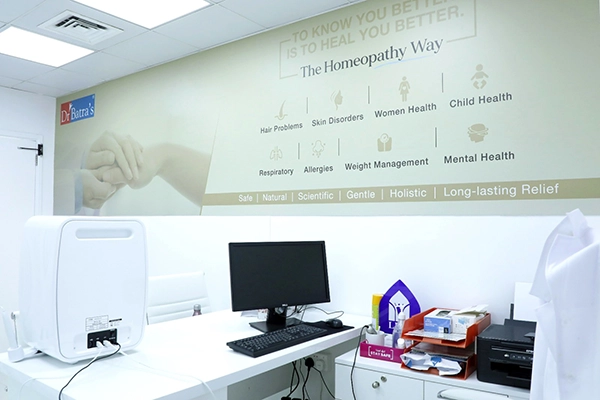Melasma Treatment in Dubai & Abu Dhabi
Melasma treatment helps reduce dark brown or grayish patches on the skin, which helps restore your skin to a more even complexion.
At Dr Batra’s® UAE, we provide safe and natural melasma treatment that is designed to fade pigmentation and prevent recurrence. Our holistic approach includes homeopathic care, skincare solutions, and lifestyle recommendations to address the root cause of your melasma.
Book an appointment today to start your journey toward clear, even-toned skin!
Why Choose Dr Batra’s® Skin Clinics for Melasma Treatment?
Trusted Experts in Skin Care
Dr Batra’s® has over 40 years of experience in treating various chronic skin conditions, including melasma. Our doctors specialise in homeopathy-based treatments that provide long-term relief for uneven skin tone and pigmentation issues.
Personalised Treatment Plans
Every patient’s skin is unique. Our doctors conduct a detailed consultation to create a customised treatment plan that is suited to your specific symptoms, triggers, and medical history for the best possible results.
Natural & Safe Healing
Unlike harsh chemical-based treatments, our homeopathic remedies work gently to regulate melanin production, reduce dark patches, and restore an even skin tone—without any harmful side effects.
Holistic Approach to Skin Health
We go beyond symptom relief. Our melasma treatment focuses on hormonal balance, lifestyle modifications, and skin care guidance to prevent future pigmentation and improve overall skin health.
Get Melasma Treatment at Conveniently Located Clinics in Dubai & Abu Dhabi
Reviews of Dr Batra’s® Melasma Treatment in Dubai & Abu Dhabi
Our Melasma Treatment Process
Step 1: Personalised Consultation
Our doctors start with a detailed skin assessment to understand the root cause of melasma. We evaluate your medical history, hormonal changes, lifestyle, and environmental triggers to design the most effective treatment plan.
Step 2: Homeopathic Treatment
We use natural homeopathic remedies to gently regulate melanin production, reduce pigmentation, and prevent recurrence. Our safe and non-invasive approach ensures long-term skin health without side effects.
Step 3: Holistic Skin & Lifestyle Guidance
Along with homeopathic treatment, we provide skin care recommendations, dietary advice, and lifestyle modifications to enhance treatment results. Sun protection and skincare habits play a crucial role in melasma management.
Step 4: Progress Monitoring
We track your improvement through regular follow-ups, adjusting your treatment as needed for optimal results. Our doctors ensure your skin continues to heal, preventing future pigmentation issues.
What is Melasma?
Melasma is a common skin condition that causes dark brown, grayish, or bluish patches to appear on the skin, most commonly on the face, neck, and arms. It occurs when melanin (skin pigment) production increases, leading to uneven skin tone and hyperpigmentation.
Melasma is often triggered by hormonal changes, sun exposure, or genetics. While it is not harmful or painful, it can be a cosmetic concern for many people. The condition tends to be persistent and may worsen without proper care and treatment.
Who Can Get Melasma?
Melasma can affect anyone, but it is more common in:
- Women, especially those between 20 to 50 years old
- Individuals with medium to dark skin tones
- Pregnant women (often called the “mask of pregnancy”)
- People with a family history of melasma
- Those who spend long hours in the sun without protection
- Individuals undergoing hormone therapy or taking birth control pills
While melasma is more frequent in women, men can also develop the condition.
Certain medications, skincare products, and stress can also contribute to melasma.
Symptoms of Melasma
Melasma typically appears as flat, symmetrical patches of brown, gray, or blue pigmentation on areas exposed to the sun, such as:
- Cheeks
- Forehead
- Nose bridge
- Upper lip
- Jawline
- Neck and forearms (in some cases)
The pigmentation may worsen with sun exposure and can take months or even years to fade. Unlike acne or other skin conditions, melasma does not cause pain, itching, or inflammation—but it can impact self-confidence.
Causes of Melasma
Melasma occurs due to an increase in melanin production, which leads to patchy pigmentation. Several factors can trigger melasma, including:
- Hormonal Changes: Pregnancy, birth control pills, and hormone therapy can stimulate excess melanin.
- Sun Exposure: UV rays activate melanin-producing cells, making pigmentation worse.
- Genetics: A family history of melasma increases the risk.
- Certain Medications: Some antibiotics, antiseizure drugs, and hormone treatments may trigger melasma.
- Cosmetic Products: Harsh skincare products or treatments that irritate the skin can worsen pigmentation.
Risk Factors of Melasma
Several factors can increase the risk of developing melasma, including:
- Skin Type: More common in medium to dark skin tones (Fitzpatrick skin types III-IV).
- Hormonal Fluctuations: Pregnancy, menopause, and birth control pills can trigger melasma.
- Sun Exposure: Spending long hours in the sun without protection can lead to pigmentation.
- Genetics: If family members have melasma, there is a higher likelihood of developing it.
- Stress: Can trigger hormonal imbalances that may lead to melasma.
- Thyroid Disorders: Some studies suggest a connection between thyroid issues and melasma.
Potential Complications Caused by Melasma
Melasma itself does not cause health complications, but if left untreated, it can:
- Become more persistent and take longer to fade.
- Darken further with continued sun exposure.
- Cause emotional distress due to cosmetic concerns.
- Resist treatment if exposed to frequent triggers like UV rays or hormonal imbalances.
Although melasma is not dangerous, early diagnosis and proper treatment can help prevent worsening pigmentation and improve skin health.
When to See a Doctor for Melasma
Consult a doctor if:
- The pigmentation is worsening or spreading.
- Melasma affects self-confidence or mental well-being.
- There is a sudden change in skin pigmentation.
A doctor or medical professional can diagnose your melasma and recommend a personalised treatment plan to help reduce pigmentation and prevent recurrence.
Frequently Asked Questions about Melasma
What is the most common cause of melasma?
The most common cause of melasma is sun exposure, which triggers excess melanin production. Hormonal changes, such as pregnancy or birth control pills, also play a key role.
What to avoid when you have melasma?
Avoid direct sun exposure, harsh skincare products, and hormonal triggers like birth control pills. Always wear broad-spectrum sunscreen to prevent worsening pigmentation.
Which hormone is responsible for melasma?
Estrogen and progesterone are linked to melasma, especially during pregnancy, hormone therapy, or when taking birth control pills. These hormones can stimulate melanin production.
How can I permanently remove melasma?
Melasma is chronic and may not be permanently removed, but it can be managed with homeopathy, sun protection, depigmenting creams, and lifestyle changes to prevent recurrence.
How to remove melasma on face naturally?
Use homeopathic treatment, gentle skincare, and natural sun protection like broad-brimmed hats and mineral sunscreens. Avoid skin irritants to prevent worsening pigmentation.
What should we eat to remove melasma?
Eat antioxidant-rich foods like berries, citrus fruits, and leafy greens. Vitamin C, E, and zinc support skin health. Stay hydrated and avoid processed foods that trigger inflammation.
If I have melasma, does that mean I’ll get thyroid disease?
Not necessarily. While melasma has been linked to thyroid disorders, it does not mean you will develop one. If you have symptoms of thyroid imbalance, consult a doctor for tests.
Can melasma be raised on the skin?
No, melasma is a flat pigmentation disorder. Unlike scars or bumps, it does not cause raised skin or texture changes—it only affects skin color.
Can melasma appear overnight?
Melasma does not appear suddenly overnight. It develops gradually over time, usually due to cumulative sun exposure, hormonal changes, or medication use.
Are freckles the same as melasma?
No. Freckles are small, light brown spots that fade in winter and are genetic. Melasma is larger, darker, hormonally influenced, and does not fade on its own.
Are age spots, sun spots, and liver spots the same as melasma?
No. Age spots (sun spots, liver spots) are caused by UV damage over time. Melasma is hormone-related and often affects women in reproductive years.
What do I do if I’m pregnant and have melasma?
Use natural, pregnancy-safe skincare, wear sunscreen daily, and avoid harsh treatments. Melasma in pregnancy is common and may fade post-delivery.
Will melasma go away after I give birth?
For some women, melasma fades after pregnancy, but for others, it persists. Sun exposure and hormones play a role. Proper skincare and treatment can help.





